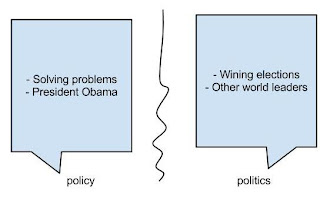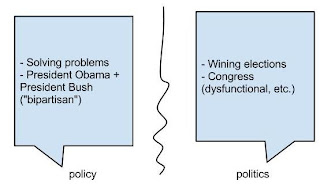The hoity-toity magazine N+1 has a long, rambling
editorial about sociology [1]. The editorial is long -- far too long -- and I'm inclined to think that
it is facetious and tongue-in-cheek. Still, I think it contains within
it an important misconception about what sociology is and does.
The argument, if I have it right, goes something like this: sociology, the Editors think, has gone too far in taking a calculative, demystifying stance
on human affairs. And as sociology never stays within the academy but
leaks out, this has made the public (or at least the public that the N+1
editors have dinner parties with) far too calculative as well.
Naturally, the Editors aren't really worried about other things that sociology has
demystified, say, religion or technology. They are mostly concerned about art and the
novel. They worry that far too many works of art are discussed in terms of the gain and loss of cultural capital by the artist. People interpret various moves that artists make as merely
strategies or
positioning. We are not earnest anymore, not passionate; we are merely cold and calculating analysts, never more so than with respect to art. Sociology's analysis of art -- the works of
Bourdieu or
Becker, say, and many others -- often makes it seem as if "art mostly expresses class and status hierarchies, and only secondarily might have snippets of aesthetic value." The Editors are worried about aesthetics. "There is still," they suggest, "a space where the aesthetic may be
encountered immediately and give pleasure and joy uninhibited by
surrounding frameworks and networks of rules and class habits."
I get the argument, as far as it goes [2]. And let's also grant that in certain circles frequented by the Editors, this does happen. There's far too much sociologizing, far too much analyzing of the moves that people make as an expression of their effort to conserve their cultural position, and far too little discussion of aesthetics. How new is this? And how much should we blame cultural sociology for this, especially the post-structuralist variety?
Let's take one example that the editorial cites, the case of Jeff Bezos:
We’ve reached the point at which the CEO of
Amazon, a giant corporation, in his attempt to integrate bookselling and
book production, has perfectly adapted the language of a critique of
the cultural sphere that views any claim to “expertise” as a mere mask
of prejudice, class, and cultural privilege. Writing in praise of his
self-publishing initiative, Jeff Bezos notes that “even well-meaning
gatekeepers slow innovation. . . . Authors that might have been rejected
by establishment publishing channels now get their chance in the
marketplace. Take a look at the Kindle bestseller list and compare it to
the New York Times bestseller list — which is more diverse?”
Bezos isn’t talking about Samuel Delany; he’s adopting the sociological
analysis of cultural capital and appeals to diversity to validate the
commercial success of books like Fifty Shades of Grey, a badly
written fantasy of a young woman liberated from her modern freedom
through erotic domination by a rich, powerful male. Publishers have
responded by reducing the number of their own “well-meaning
gatekeepers,” actual editors actually editing books, since quality or
standards are deemed less important than a work’s potential appeal to
various communities of readers. [my emphasis.]
The Editors seem to imply that Bezos read Bourdieu and then came up with his strategy of how to attack those who opposed Amazon's self-publishing initiatives on aesthetic grounds (exhibit one: the N+1 Editors themselves) i.e. characterize them as gatekeepers trying to protect their fiefdom.
How true is this? My guess is not at all. Bezos may well have read Bourdieu but there is nothing new whatsoever about his strategy; it's hundreds of years old and definitely older than when the word "cultural capital" was invented. Take a look, for example, at Andrew Abbott's brilliant
sociological history of the professions. When different groups warred over a task (doctors and nurses over medical care, accountants and lawyers over certain kinds of corporate money management, psychiatrists and psychologists over how mental problems should be treated),
they have always resorted to some version of this language of gate-keeping to characterize the other side. As
Wendy Espeland says: "
our tendency [is] to see others as having interests where we have commitments." Sociologists have often taken this as their fundamental problem asking: how does this come to be? What does this say about the production of the social order? And so on.
In other words, sociologists did NOT invent demystification in the academy from where it supposedly diffused across society so that now even Jeff Bezos adopts the language of cultural capital, interests and gate-keeping. It was already there, has always been there, and usually comes to the fore when controversies arise [3]
.
Take the passing of the Affordable Care Act, for instance. Throughout the debate, Republicans alleged that the ACA was a thinly veiled attempt at the redistribution of income, and an effort to take control (of medical decisions) away from families and into the hands of the federal government. They portrayed themselves as standing for seniors, and Obama as a socialist. Democrats, for their part, suggested that Republicans did not care about the uninsured, and only cared about protecting the interests of the insurance companies. Insurance companies, often working behind the scenes, were demonized by everyone but doctors were usually not. Seniors were quite sure that the ACA was an effort to take away the health-care that they rightfully deserved. Throughout the debate, you saw actors imputing tawdry "interests" to their opponents and portraying themselves as being committed to certain values. You might say that they had all gone and read Bourdieu. Or you might say that this is how social controversies are fought and settled.
Or, take MOOCs (
Massive Open Online Courses, for those who haven't heard of them), for instance. MOOCs have been the topic of great dispute in the public sphere. And in the debate, you see the same confluence of imputed interests and personal commitments. The
much-famous open letter that the philosophy faculty at San Jose State University wrote to Michael Sandel suggested that MOOCs might be part of a neoliberal transformation of the university and an ongoing commodification of education (classes produced at a factory at Harvard, then distributed to community colleges and state universities, which then only need to hire TAs, and so on), and not so much about improving access for students. On the other hand, MOOC inventor Sebastian Thrun
emphasizes the kind of easy acccess that made his Artificial Intelligence course at Stanford so famous:
Yet there is one project he's happy to talk about. Frustrated that
his (and fellow Googler Peter Norvig's) Stanford artificial intelligence
class only reached 200 students, they put up a website offering an
online version. They got few takers. Then he mentioned the online course
at a conference with 80 attendees and 80 people signed up. On a Friday,
he sent an offer to the mailing list of a top AI association. On
Saturday morning he had 3,000 sign-ups—by Monday morning, 14,000.
In the midst of this, there was a slight hitch, Mr. Thrun says. "I
had forgotten to tell Stanford about it. There was my authority problem.
Stanford said 'If you give the same exams and the same certificate of
completion [as Stanford does], then you are really messing with what
certificates really are. People are going to go out with the
certificates and ask for admission [at the university] and how do we
even know who they really are?' And I said: I. Don't. Care."
Aaron Bady, a graduate student at Berkeley and one of the hottest voices in the blogosphere says: "not so fast!" Bady
plays up Thrun's tenure at Google, suggests that Thrun is interested not so much in improving access as much as increasing Google's bottom line:
The MOOC that debuted in IHE in December 2011 was Sebastian Thrun’s
“Artificial Intelligence” MOOC, a course that was offered at Stanford
but opened up to anyone with a broadband. The way this story is usually
told is that his incredible success—160,000 students, from 190
countries—encouraged Thrun to leave Stanford to try the new mode of
pedagogy that he had stumbled upon. He had seen a TED talk given by
Salman Khan, the founder of Khan Academy, and when he decided to give it
a whirl and it was a huge success, the rest is history. In January,
2012, he would found the startup Udacity.
However, another way to tell the story would be that Thrun was a
Google executive—who was already well known for his work on Google’s
driverless car project—and that he had already resigned his tenure at
Stanford in April 2011, before he even offered that Artifical
Intelligence class. Ending his affiliation with Stanford could be
described as completing his transition to Silicon Valley proper. In
fact, despite IHE’s singular “a Stanford University professor,” Thrun
co-taught the famous course with Google’s Director of Research, Peter
Norvig.
It’s important to tell the story this way, too, because the first
story makes us imagine a groundswell of market forces and unmet need, a
world of students begging to be taught by a Stanford professor and
Google, and the technological marvels that suddenly make it possible.
But it’s not education that’s driving this shifting conversation; as the
MOOC became something very different in migrating to Silicon Valley,
it’s in stories told by the New York Times, the WSJ, and TIME magazine
that the MOOC comes to seem like an immanent revolution, whose pace is
set by necessity and inevitability.
You might say that this actually proves the Editors' point because Bady is a graduate student and has definitely read his Bourdieu. I would suggest that that would be missing the big picture.
The point is: this kind of debate, with imputations of nefarious interests and declarations of personal commitment, are routine, especially in the midst of social controversies. Blaming cultural sociology for this is giving academics too much credit [4]
.
In fact, sociologists (and historians, and anthropologists, and literary studies scholars, and most scholars of the humanities) have always grappled with a
strange paradox. Sociologist study "society"--an object that is itself a can of worms. Society is more than the sum of the people who constitute it. Yet, when one starts investigating the social world, one discovers that most people are themselves lay-sociologists. Or to put it in a different way, sociologists themselves are trying to come up with a more systematic version of what people do routinely in their life. They analyze their own social world, their "society" and strategize. Parents spend a great deal of time
managing their children's spare time because they know this will serve the child well later on in life. Teenagers routinely think about what they want to do for a living; they know that going to a good college is a big part of achieving it. People spend a great deal of time picking spouses and friends. They may not always succeed in getting what they want, but they think about it nevertheless.
Academic sociology then is built on the foundation of everyday reasoning [this, in fact, is the central insight of
Harold Garfinkel's ethnomethodology]. All sociological concepts--power, prestige, cultural capital, class, race, gender--are based on everyday versions of these categories. And in fact, one of the divides in sociology--between qualitative and quantitative sociologists--is based precisely on different understandings of this relationship between this scholarly and lay sociology. At the risk of over-simplifying, most quantitative sociologists will acknowledge this relationship but suggest that a reliance on large numbers, aggregates and the methods of statistics can be a useful way of differentiating specialist sociology from its lay variant. And qualitative sociologists believe that because actors are always theorizing about their own circumstances, this understanding needs to be
part of any theory about society.
Let me end on a tongue-in-cheek note (which will probably drive the Editors up a wall). A while ago, A. O. Scott wrote on an essay on a number of smart young men and women who had all teamed up to
start two little magazines.
"You'd better mean something enough to live by it," Kunkel told me,
echoing both his fictional creation and, as it happens, one of his
comrades in another literary enterprise. On the last page of the first
issue of n+1, a little magazine that made its debut last year, the
reader learns that "it is time to say what you mean." The author of that
declaration, a forceful variation on some of Dwight Wilmerding's more
tentative complaints, is Keith Gessen, who edits n+1 along with Kunkel,
Mark Greif and Marco Roth. All four editors are around Dwight's age -
he's 28 when the main action in the book takes place; they're 30 or a
little older. Like him, they often glance anxiously and a bit
nostalgically backward to a pre-9/11, pre-Florida-recount moment that
seems freer and more irresponsible than the present. You wouldn't,
however, call any of them any kind of idiot. Nor, based on their
pointed, closely argued and often brilliantly original critiques of
contemporary life and letters, would you accuse them of indecision,
though they do sometimes display a certain pained 21st-century
ambivalence about the culture they inhabit.
N+1 is not the first
small magazine to come out of this ambivalence or the first to have its
mission encapsulated by a memoiristic account of the attempt to figure
out one's life. Consider the following scrap of dialogue from Dave
Eggers's "Heartbreaking Work of Staggering Genius," famously hailed as
the manifesto of a slightly earlier generational moment:
"And how will you do this?" she wants to know. "A political party? A march? A revolution? A coup?"
"A magazine."
Eggers
is talking about an old (in fact, a defunct) magazine called Might, but
never mind. Even with a bit of historical distance - five years after
the book's publication, a decade and more after the events it describes -
these lines capture both a moment and the general spirit of the
magazine-starting enterprise. A bunch of ambitious, like-minded young
friends get together to assemble pictures and words into a sensibility -
a voice, a look, an attitude - that they hope will resonate beyond
their immediate circle.
And yet, look at how these nice young men met:
The four editors of n+1 are also connected by shared sensibilities and
school ties. Kunkel, who grew up in Colorado, went from Deep Springs
College, a tiny, all-male school in the California desert devoted to the
classical ideal of rigorous study in a pastoral setting, to Harvard,
where he met Greif, though not Gessen, who was also there at the time.
(Actually, they later discovered that they did have one brief encounter
as undergraduates, about which Kunkel would say only that at least one
of them was drunk and that one suggested the other should get a
lobotomy.) Gessen, who lived in the Soviet Union until he was 6, was a
football player at Harvard and went on to get an M.F.A. in fiction from
Syracuse. Greif entered the Ph.D. program in American studies at Yale,
where he met Roth, who had arrived via Oberlin and Columbia to pursue
his doctorate in comparative literature. After talking about it for
years - another friend from Harvard, Chad Harbach, who edits the n+1 Web
site, thought of the name back in 1998 - they decided the moment was
right to put their ideas and aspirations into print.
Harvard and Yale. Hmmm. I'm dying to use the term "cultural privilege" but I won't.
I don't mean to doubt the Editors' sincerity or commitment to producing a certain kind of literature. But the fact remains that in order to fulfill any high-minded goals, you need to descend to the ground, to use existing resources. The Editors all meant through social networks that were spawned by attending elite universities. They decided to start a
magazine--not a blog, and not an only-online publication. They made -- or were constrained to make -- certain kinds of choices to reach their goals. And finally, they were the object of a piece in --of all places! -- the New York Times Magazine that vastly improved their magazine's visibility (I, certainly, had not heard of N+1 until I read Scott's piece). In Scott's article, the Editors go out of their way to assert what makes their magazine different, their commitment to a certain style of writing, of seeing the world. Other magazines, they suggest, are moribund, caught up in a rut; N+1 is fresh and young.
To me, what the Editors are doing in that piece is a version of the "impute interests to others, values to self" rhetoric that they then criticize in an editorial published many years later and blame on academic cultural sociology. Which only goes to show that the phenomenon itself has been around a long long time.
--------------------------------------------------------------------------------------------------
Endnotes:
[1] And of course, written in its characteristic style with the imperial
"we," that, to me at least, often feels like a reference to the small
segment of the cultural elite they feel an ineffable bond with.
[2] I am not sure who these people are who analyze art at dinner parties
using cultural sociology. In the circles I hang out with, art is still
discussed with reference to aesthetics. And nothing that I read in high
culture magazines like the New York Review of Books or the New Republic
convinces me that we now discuss art in terms of art-makers managing
cultural capital rather than its deep aesthetic value.
[3] "Always" may be an overstatement. But certainly one sees examples of this from the early modern period.
[4] That said, it's always flattering when someone credits the humanities with that much influence.






